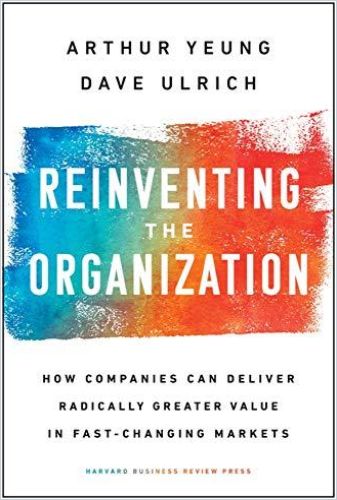Development gurus Dave Ulrich and Arthur Yeung detail how to become leaner, smarter and faster to embrace the future.

Embrace Agility
Development expert and prolific author Dave Ulrich teaches at the Ross School of Business, University of Michigan, and also leads RBL Group, a management consulting firm. Arthur Yeung leads innovation and leader development at Tencent Group in China.
Ulrich and Yeung implore business leaders to make their firms faster, agile and more adaptive. They invoke the specters of Blockbuster and Nokia, which grew complacent and recognized the need for radical change too late. Ulrich and Yeung offer tangible solutions for software and product development methodologies. They provide a clear approach to reinventing your firm for modern business, no matter its age, size, location or industry.
Business leaders find much to admire in Ulrich and Yeung’s approach and presentation. Ram Charan, author of several important business books, including Rethinking Competitive Advantage, said, “Rarely does such a paradigm-defining book appear that will change our understanding of organizations.” Founder of CEO.works Sandy Ogg finds that the authors have “…identified a new way of thinking about organizations, as market-oriented ecosystems that will help all of us thrive in a fast-changing environment.”
Reinvention
Radical change and transformation take persistence and effort, but wise leaders, Ulrich and Yeung caution, recognize that inertia exacts a much higher price. They cite Nokia, Blockbuster, AOL and other firms that fell because they were slow to change. Conversely, the authors offer Amazon, Google, Tencent and Supercell as exemplars of how to avoid stagnation and stasis. Ulrich and Yeung assert that organizations can reinvent themselves for success, even in today’s VUCA world.
Agility
The authors note that you have most likely structured your firm as a hierarchy with clear roles and rules; as a system that aligns strategy, people, rewards and processes around the work; or as a system that operates around capabilities. They warn you that these models look inward and operate on known assumptions. To avoid becoming Kodak or Sears, they advise you must look outward, become market-oriented and emphasize agility.
Market-oriented organizations challenge the rules of competition to focus less on market share and more on market opportunity. Dave Ulrich and Andrew Yeung
Ulrich and Yeung counsel letting the market dictate your direction and the way you structure your firm, employees, partners and knowledge-sharing processes.
Context
Assess your current situation against what you do and how you do it. If, like so many other firms, you do the wrong things well, you may generate impressive revenues, but, the authors caution, you may not realize the peril of your situation. You could be the next Myspace or Blockbuster – firms that did the right things well until they didn’t.
You don’t just want to run organizational experiments; you want to have real and sustainable impact.Dave Ulrich and Andrew Yeung
To help you assess the environment and your company’s context, the authors offer their “STEPED” approach, which examines social change, technology trends, economic change, political shifts, and environmental and demographic trends.
Speed, Agility and Discovery
Ulrich and Yeung prioritize a fluid strategy that morphs as the market shifts. They recommend embracing input from employees, customers and investors. A proper agile strategy, they explain, gets you where the market will be rather than where it’s been.
They suggest you build, buy and borrow the elements you need. Build your core, as Google did with its search engine. Buy pieces you need to have in-house, as Amazon did in acquiring Whole Foods.
Capabilities and Structure
To create your ecosystem, Ulrich and Yeung advise, you should figure out what you need inside the firm and what you can leverage through alliances. Build platforms and partnerships to collect and share knowledge, insights and expertise. They emphasize the importance of data, innovation, agility and customer engagement.
The authors stress that small, nimble, capable, purposeful and self-directed teams provide established companies with the speed and agility of start-ups. But for that to work, Ulrich and Yeung insist, you must give them central, shared resources like those in a big firm.
Governance
Further vesting in their themes, Ulrich and Yeung urge you to move away from governance in the form of rules, boundaries and bureaucracy. Instead, they say, focus on how culture, performance management, recruiting, knowledge sharing and collaboration position your firm to recognize and act on opportunities.
The authors counsel patience regarding innovation; great ideas arrive only after a lot of thought, revision and work. To that end, Ulrich and Yeung urge investing in your best people, those who achieve their mission by serving yours. Let people move freely – team to team – so they can find purpose and connection.
Establish what you want from your leaders and how they should behave. Dave Ulrich and Arthur Yeung
To encourage movement, help teams share ideas – with credit to the originator. Embrace radical openness and recognize and reward teams and individuals who share ideas, discoveries, time and methods. By resisting the urge to command and control, Ulrich and Yeung stress, leaders create other leaders.
Mirror
Dave Ulrich and John Yeung mirror their philosophy in the way they present their ideas. They write with admirable economy and directness, and offer their commonsense strategies in easily digested, memorable and actionable sentences. They want you to understand and implement their ideas, so they don’t waste your time telling you how great or knowledgeable they are – they just prove it on every page. As Ulrich’s and Yeung’s tactics and methods augur a new era of fast-moving, effective businesses, so their approach to providing guidance mirrors those methods: Their prose is agile and suggests reinvention of the business author’s role as well as of business itself.
Other Dave Ulrich books that illuminate his ideas include Victory Through Organization, HR From the Outside In and The Leadership Capital Index. Corollary works include Beyond Performance by Scott Keller and The Disruption Mindset by Charlene Li.












